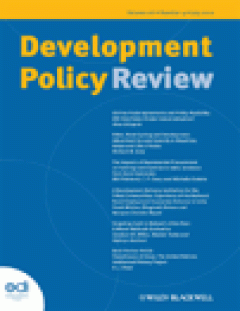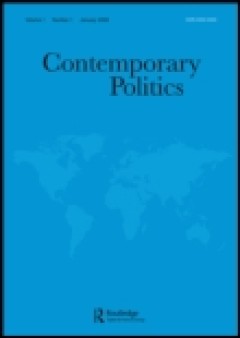Filter by

The Macroeconomics of Doubling Aid to Africa and the Centrality of the Supply…
The proposed doubling of aid to Africa by 2010 is a less simple proposition, from a recipient point of view, than is commonly supposed. This article argues that it is difficult to manage large and rapidly increasing aid inflows in ways which do not disadvantage producers of tradeable goods, and the private sector generally. This difficulty can be averted if conscious efforts are made to offset …
- Edition
- Vol 29, Supplement s1, Jan 2011. pages s83–s108
- ISBN/ISSN
- 14675986
- Collation
- -
- Series Title
- Development Policy Review Special Issue: Aid, Institutions and Governance: What Have We Learned?
- Call Number
- -

The PRSP Approach and the Illusion of Improved Aid Effectiveness: Lessons fro…
Since 1999, poor countries that want to qualify for concessionary IMF loans and debt relief must elaborate and implement Poverty Reduction Strategy Papers. Donors claim that the PRSP approach will increase aid effectiveness since PRSPs will enhance broad country ownership and lead to better �partnership� with donors, implying more donor co-ordination under government leadership. By examining th…
- Edition
- Vol 29, Supplement s1, Jan 2011. pages s110–s133
- ISBN/ISSN
- 14675986
- Collation
- -
- Series Title
- Development Policy Review Special Issue: Aid, Institutions and Governance: What Have We Learned?
- Call Number
- -

The Poverty Reduction Strategy Approach Six Years On: An Examination of Princ…
It is over six years since the World Bank and the IMF started promoting a PRS approach to development management in low-income countries. The 2005 review endorsed the approach, but highlighted the need for a renewed focus on the principles underpinning it: country ownership; results orientation; comprehensiveness; partnership focus; and long-term outlook. Uganda is often hailed as one of the be…
- Edition
- Vol 29, Supplement s1, Jan 2011. pages s135–s156
- ISBN/ISSN
- 14675986
- Collation
- -
- Series Title
- Development Policy Review Special Issue: Aid, Institutions and Governance: What Have We Learned?
- Call Number
- -

Interobjectivity: Representations and artefacts in Cultural Psychology
This paper revisits the emerging concept of interobjectivity and furthers Moghaddam�s (2003, 2006) proposal to prioritize this concept in Cultural Psychology. We argue that Heidegger�s phenomenology provides insights into a foundational understanding of what interobjectivity entails. We argue that human relations are not essentially characterized by intersubjective relations but rely on the non…
- Edition
- Vol. 16 no. 4. December 2010.pp. 451-463
- ISBN/ISSN
- 1354067x
- Collation
- -
- Series Title
- Culture Psychology
- Call Number
- -

Commentary: Intersubjectivity, interobjectivity, and the embryonic fallacy in…
Traditional research adopts the embryonic fallacy: the assumption that as soon as life begins, the individual becomes the source of psychological experiences. The embryonic fallacy has resulted in intersubjectivity being treated as �a problem�: how can each individual, the source of private experiences, understand the private experiences of �self-contained� others? This �problem� disappears whe…
- Edition
- Vol. 16 no. 4. December 2010.pp. 465-475
- ISBN/ISSN
- 1354067x
- Collation
- -
- Series Title
- Culture Psychology
- Call Number
- -

Elective interdependence: Understanding individual agency and interpersonal r…
Parents� beliefs and ethnotheories about family life in general and childcare in particular contain explicit and implicit ideas about the manner in which children ought to be raised. Cultural scripts, family situations, and parents� own beliefs and experiences have been known to guide parenting choices. Cultural practices in India have been deeply influenced by the textured history of external …
- Edition
- Vol. 16 no. 4. December 2010.pp. 477-496
- ISBN/ISSN
- 1354067x
- Collation
- -
- Series Title
- Culture Psychology
- Call Number
- -

User-assisted query translation for interactive cross-language information re…
Interactive Cross-Language Information Retrieval (CLIR), a process in which searcher and system collaborate to find documents that satisfy an information need regardless of the language in which those documents are written, calls for designs in which synergies between searcher and system can be leveraged so that the strengths of one can cover weaknesses of the other. This paper describes …
- Edition
- Vol. 44, No. 1, Page 181-211
- ISBN/ISSN
- 0306-4573
- Collation
- -
- Series Title
- Information Processing & Management
- Call Number
- -

Commentary: Autonomy and relatedness reconsidered: Learning from Indian families
- Edition
- Vol. 16 no. 4. December 2010.pp. 497-505
- ISBN/ISSN
- 1354067x
- Collation
- -
- Series Title
- Culture Psychology
- Call Number
- -
- Edition
- Vol. 16 no. 4. December 2010.pp. 497-505
- ISBN/ISSN
- 1354067x
- Collation
- -
- Series Title
- Culture Psychology
- Call Number
- -

Commentary: The complex construction of psychological identities in Palestine…
Contemporary Palestinian youth engage with a tragic master narrative of loss and dispossession supported by the social structure of ongoing intractable conflict and Israeli military occupation. This article illustrates a narrative and idiographic approach to research in cultural psychology, interrogating the relationship between constructions of personal identity and the master narrative of Pal…
- Edition
- Vol. 16 no. 4. December 2010.pp. 539-548
- ISBN/ISSN
- 1354067x
- Collation
- -
- Series Title
- Culture Psychology
- Call Number
- -

The cultural psychology of Palestinian youth: A narrative approach
Contemporary Palestinian youth engage with a tragic master narrative of loss and dispossession supported by the social structure of ongoing intractable conflict and Israeli military occupation. This article illustrates a narrative and idiographic approach to research in cultural psychology, interrogating the relationship between constructions of personal identity and the master narrative of Pal…
- Edition
- Vol. 16 no. 4. December 2010.pp. 507-537
- ISBN/ISSN
- 1354067x
- Collation
- -
- Series Title
- Culture Psychology
- Call Number
- -

The Origins and Restriction of Efficiency in Public Administration: Regaining…
This article is primarily a study in the history of the concept of efficiency. It is argued that efficiency originated in Aristotelian ideas about causality and acquired a broad, substantive meaning of �moving force.� This meaning of the term was dominant well into 20th-century studies of public administration. In the course of the 20th century, however, efficiency became predominantly understo…
- Edition
- Vol. 42 no. 7. November 2010.pp. 755-779
- ISBN/ISSN
- 00953997
- Collation
- -
- Series Title
- Administration & Society
- Call Number
- -

Stimulating Entrepreneurial Practices in the Public Sector: The Roles of Orga…
Unlike the practices of contracting out and privatization, which reduce public sector involvement and responsibility in service provision, public entrepreneurial practices may be one of the best ways to improve government performance and meet citizens� demand efficiently and effectively. This study examines the relationships between organizational characteristics and public entrepreneurship in …
- Edition
- Vol. 42 no. 7. November 2010.pp. 780-814
- ISBN/ISSN
- 00953997
- Collation
- -
- Series Title
- Administration & Society
- Call Number
- -

The Bureau of Municipal Research and the Development of a Professional Public…
This article explores the professionalization of public administration in terms of its relation to the New York Bureau of Municipal Research. The formation of the New York Bureau of Municipal Research in 1907 served as the catalyst for the creation and expansion of a professional public service. Although public administration has failed to transform into a profession, this article shows that th…
- Edition
- Vol. 42 no. 7. November 2010.pp. 815-835
- ISBN/ISSN
- 00953997
- Collation
- -
- Series Title
- Administration & Society
- Call Number
- -

Virtual Government–Citizen Relations: Informational, Transactional, or Coll…
Public administration theory and practice suggest that e-government, citizen participation, and government�citizen collaboration are contributing to a movement toward New Public Service�as opposed to Old Public Administration and New Public Management. We explore this by focusing on the relationship between the Washington, D.C., police and local residents via online discussion groups. We ask, H…
- Edition
- Vol. 42 no. 7. November 2010.pp. 836-858
- ISBN/ISSN
- 00953997
- Collation
- -
- Series Title
- Administration & Society
- Call Number
- -

Into the Woods: A Cautionary Tale for Governance
In 2010, the state is not merely hollow but increasingly empty, and those of us in government have to find their energy and purpose in the process of rebuilding it. Our happy endings�the specific outcomes we claim to want�somehow come along with unexpected twists and losses. We�ve discovered that life and governance aren�t linear and predictable. In the 20th century, public administration (PA) …
- Edition
- Vol. 42 no. 7. November 2010.pp. 859-883
- ISBN/ISSN
- 00953997
- Collation
- -
- Series Title
- Administration & Society
- Call Number
- -

Immigration and integration policy and the Austrian radical right in office: …
This article focuses on the radical right's influence on immigration and migrant integration policy by scrutinising the 6-year period in national government of the Austrian Freedom Party and Alliance for Austria's Future. Specifically, it investigates the radical right's influence on migration control, migrant integration, citizenship and asylum policy. While previous studies have often credite…
- Edition
- Volume 16, Issue 4 December 2010 , pages 337 - 354
- ISBN/ISSN
- 13569775
- Collation
- -
- Series Title
- Contemporary Politics
- Call Number
- -

Problems of political transition in Ukraine: leadership failure and democrati…
Democratisation and consolidation of a political system encompass a range of complex challenges, for which effective leadership is pivotal. However, the skills that a leader requires to break through and introduce change are not necessarily the same as those needed to maintain stability. This article examines the case of Viktor Yushchenko as president of Ukraine following the Orange Revolution.…
- Edition
- Volume 16, Issue 4 December 2010 , pages 355 - 367
- ISBN/ISSN
- 13569775
- Collation
- -
- Series Title
- Contemporary Politics
- Call Number
- -

Crafting democratic control of the military in South Korea and the Philippine…
This article explores how a military's organizational character (cohesion or lack thereof) shapes military officers' attitudes toward new civilian leadership in democratizing South Korea and the Philippines. It suggests that a factionalized military makes civilian control much more difficult and the route to democratic consolidation highly unstable and incomplete for three reasons. First, in th…
- Edition
- Volume 16, Issue 4 December 2010 , pages 369 - 382
- ISBN/ISSN
- 13569775
- Collation
- -
- Series Title
- Contemporary Politics
- Call Number
- -

Myanmar: analyzing problems of transition and intervention
Myanmar's State Peace and Development Council touts the 2010 elections as an important milestone on the roadmap to democracy. While the consensus among scholars is that the result is a foregone conclusion, these elections may also mark the beginning of a transition. As a transition from authoritarian rule may lead to internal chaos and result in calls for external intervention, the relevant dim…
- Edition
- Volume 16, Issue 4 December 2010, pages 383 - 401
- ISBN/ISSN
- 13569775
- Collation
- -
- Series Title
- Contemporary Politics
- Call Number
- -

State crimes against democracy in the war on terror: applying the Nuremberg p…
This article asks whether, in waging war in the Middle East, the Bush-Cheney Administration developed and executed a conspiracy comparable to the one for which Nazi leaders were tried, convicted, and executed at Nuremberg after World War II. To meet the Nuremberg standards, such a conspiracy must include efforts to subvert the constitutional order. Today, scholars refer to these actions as 'sta…
- Edition
- Volume 16, Issue 4 December 2010 , pages 403 - 420
- ISBN/ISSN
- 13569775
- Collation
- -
- Series Title
- Contemporary Politics
- Call Number
- -
 Computer Science, Information & General Works
Computer Science, Information & General Works  Philosophy & Psychology
Philosophy & Psychology  Religion
Religion  Social Sciences
Social Sciences  Language
Language  Pure Science
Pure Science  Applied Sciences
Applied Sciences  Art & Recreation
Art & Recreation  Literature
Literature  History & Geography
History & Geography